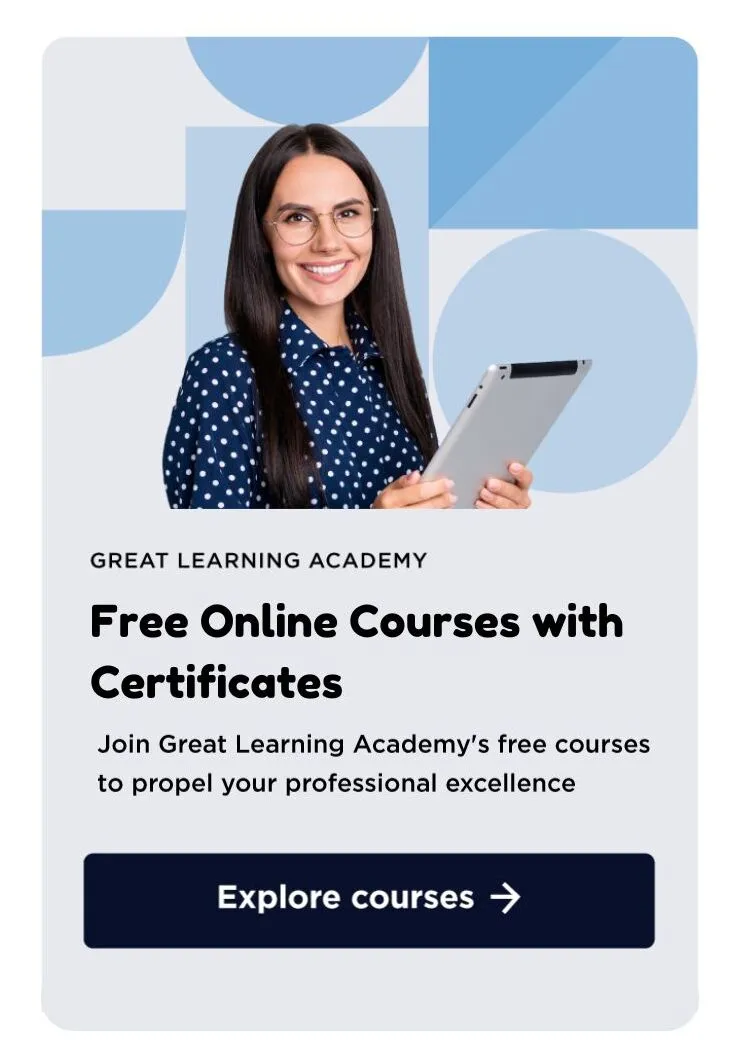- For students with a PCM background, some of the notable career paths and courses include:
- For those who studied PCB, the options include:
- How To Choose the Best Career Options After 12th Science?
- Different Career Options after 12th Science (PCM, PCB)
- Career Options & Roadmap for Science Students
- 3. Research and Academia (PCM or PCB)
- 4. Information Technology and Data Science (PCM Preferred)
- 5. Environmental Science and Sustainability (PCB or PCM)
- 6. Business and Management (Open to all streams)
- Wrapping Up
After completing 12th grade in the science stream, students have a wide array of career options and courses to choose from. The options vary based on whether your focus was on PCM (Physics, Chemistry, Mathematics) or PCB (Physics, Chemistry, Biology).
For students with a PCM background, some of the notable career paths and courses include:
Engineering Specializations:
Such as Civil, Electrical, Mechanical, Automobile, Computer Science, Electronics, and Communications, among others. These are typically four-year Bachelor of Engineering (B.E) or Bachelor of Technology (B.Tech) programs.
Architecture:
A five-year Bachelor of Architecture (BArch) program focusing on design and construction.
Physical Sciences:
Including specializations like BSc in Physics, Mathematics, Statistics, and Astronomy.
Information Technology:
Such as Bachelor of Science in IT and Software, or Bachelor of Computer Applications (BCA).
Data Science:
An emerging field offering various undergraduate courses.
For those who studied PCB, the options include:
Medical Fields:
Such as Bachelor of Medicine and Bachelor of Surgery (MBBS), Bachelor of Dental Surgery (BDS), Bachelor of Ayurvedic Medicine and Surgery (BAMS), and Bachelor of Homeopathic Medicine and Surgery.
Biological Sciences:
Like Biotechnology, Microbiology, Biochemistry, and Molecular Biology.
Environmental Sciences:
Courses in Agriculture, Forensic Science, Marine Biology, and Environmental Science.
Healthcare Specializations:
Including Nursing, Physiotherapy, and Nutrition and Dietetics.
Apart from these, there are also interdisciplinary and alternative career options like Journalism, Psychology, Hotel Management, Event Management, and Entrepreneurship, which are open to students from both PCM and PCB streams.
How To Choose the Best Career Options After 12th Science?
We understand how daunting it can be to choose the correct career path after the 12th class. While some of you may already have enrolled yourselves in various entrance exams and have a vision, others might not have a way around it. However, being clueless is not as bad as it sounds, as long as you have some time to decide. Let’s sort of have to choose the best career options after 12th for you.
Understand what you are passionate about
As much as you might be forced to follow the rat race, we suggest going after what it is that you are passionate about. If you want to go for traditional career options like Engineering, Doctor, or Architect, then without any doubt go for it. However, if you want to choose a career as a graphic designer and take up a course in graphic design, then why not? Spend some time exploring what it is that you want to pursue.
Research & select the relevant course
Once you have narrowed down the field of study you are interested in, go ahead and look for the kind of courses available in that field. There are several part-time/full-time courses, distance learning, diploma degrees, and whatnot. Make a well-researched decision about which course is best after 12th.
Determine the career prospects in your chosen field
Now that you have done most of the difficult work, it’s time to look for the future that might hold for the field you want to pursue further. Understand if it will provide you with sufficient growth opportunities- both professionally and economically.
Different Career Options after 12th Science (PCM, PCB)
Here’s a comprehensive list of 25 different career options after 12th science, including relevant courses, eligibility criteria, duration, and median salary in India:
| Career Option | Relevant Course(s) | Eligibility | Duration | Median Salary (INR per annum) |
|---|---|---|---|---|
| Pharmacist | B.Pharm, Pharm.D | 10+2 with PCM/PCB, Entrance Exam | 4-6 Years | ₹3 – ₹6 Lakhs |
| Engineer | B.Tech/B.E in various specializations | 10+2 with PCM, JEE or other Entrance Exams | 4 Years | ₹4 – ₹7 Lakhs |
| Architect | Bachelor of Architecture (B.Arch) | 10+2 with PCM, NATA/JEE Main Paper 2 | 5 Years | ₹3 – ₹6 Lakhs |
| Pilot | Commercial Pilot Training | 10+2 with PCM, DGCA Exams | 2-3 Years | ₹5 – ₹20 Lakhs |
| Data Scientist | B.Tech in CS/IT, B.Sc in Data Science | 10+2 with PCM, Entrance Exams | 3-4 Years | ₹5 – ₹12 Lakhs |
| Doctor | MBBS | 10+2 with PCB, NEET-UG | 5.5 Years | ₹6 – ₹12 Lakhs |
| Aerospace Engineer | B.Tech in Aerospace Engineering | 10+2 with PCM, JEE or other Entrance Exams | 4 Years | ₹5 – ₹10 Lakhs |
| Ayurvedic Doctor | Bachelor of Ayurvedic Medicine and Surgery | 10+2 with PCB, Entrance Exam | 5.5 Years | ₹3 – ₹6 Lakhs |
| Computer Applications Specialist | Bachelor of Computer Applications (BCA) | 10+2 with Mathematics, Merit-based/Entrance | 3 Years | ₹2.5 – ₹6 Lakhs |
| Dentist | Bachelor of Dental Surgery (BDS) | 10+2 with PCB, NEET-UG | 5 Years | ₹4 – ₹8 Lakhs |
| Forensic Scientist | B.Sc in Forensic Science | 10+2 with PCM/PCB, Entrance Exam | 3 Years | ₹3 – ₹6 Lakhs |
| IT Professional | BSc Information Technology | 10+2 with PCM/PCB, Entrance Exam | 3 Years | ₹2.5 – ₹6 Lakhs |
| Mathematician | BSc Mathematics | 10+2 with Mathematics, Merit-based | 3 Years | ₹3 – ₹6 Lakhs |
| Nurse | B.Sc Nursing | 10+2 with PCB, Entrance Exam | 4 Years | ₹2.5 – ₹6 Lakhs |
| Physiotherapist | Bachelor of Physiotherapy (BPT) | 10+2 with PCB, Entrance Exam | 4.5 Years | ₹2.5 – ₹6 Lakhs |
| Veterinary Doctor | B.V.Sc & AH | 10+2 with PCB, Entrance Exam | 5.5 Years | ₹3 – ₹7 Lakhs |
| Agriculturist | BSc Agriculture | 10+2 with PCM/PCB, Entrance Exam | 4 Years | ₹2.5 – ₹5 Lakhs |
| Biotechnologist | B.Sc/B.Tech in Biotechnology | 10+2 with PCM/PCB, Entrance Exam | 3-4 Years | ₹3 – ₹6 Lakhs |
| Physicist | BSc Physics | 10+2 with PCM, Merit-based/Entrance | 3 Years | ₹3 – ₹6 Lakhs |
| IT Engineer | BTech Information Technology | 10+2 with PCM, JEE or other Entrance Exams | 4 Years | ₹4 – ₹7 Lakhs |
| Designer | B.Des (Design specializations) | 10+2, Entrance Exam like NID, NIFT | 4 Years | ₹3 – ₹7 Lakhs |
Please note that the median salary data is estimated based on the current job market in India and may vary based on several factors including experience, location, and the specific employer. The eligibility criteria might also change based on the institute’s specific requirements. For the most accurate and up-to-date information, it is recommended to refer to the websites of respective educational institutions and professional industry reports.
Career Options & Roadmap for Science Students
For science students in India, there are several career paths available, each with its own set of courses and skill development roadmaps. Here’s a brief overview of some prominent job roles and the educational path leading to these careers:
1. Engineering Fields (PCM Stream)
Key Highlights
Job Roles: Civil Engineer, Mechanical Engineer, Electrical Engineer, Computer Science Engineer, Aerospace Engineer, Biotechnology Engineer, etc.
Roadmap:
- Complete 12th with PCM.
- Pursue a Bachelor of Engineering (B.E) or Bachelor of Technology (B.Tech) in the chosen specialization.
- Clear entrance exams like JEE (Mains and Advanced), BITSAT, etc., for admission to top engineering colleges.
- Consider gaining additional certifications or a Master’s degree for advanced roles.
- Internships and practical experience are crucial for skill enhancement.
Engineering is a diverse field that encompasses a wide range of specializations within the PCM (Physics, Chemistry, Mathematics) stream. It plays a pivotal role in shaping modern society by designing, developing, and maintaining infrastructure, technologies, and systems that improve our quality of life. Here are some of the key details about engineering fields, including job roles, educational roadmap, and career progression:
Job Roles:
- Civil Engineer: Civil engineers are responsible for designing, constructing, and maintaining infrastructure such as roads, bridges, buildings, and water supply systems. They also play a crucial role in environmental conservation and urban planning.
- Mechanical Engineer: Mechanical engineers design and develop machinery, equipment, and mechanical systems. They work in industries like automotive, aerospace, manufacturing, and energy to create efficient and innovative solutions.
- Electrical Engineer: Electrical engineers focus on electrical systems, including power generation, transmission, and distribution. They work in various industries, from electronics and telecommunications to energy and automation.
- Computer Science Engineer: Computer science engineers work with software and hardware systems, designing and developing computer software, networks, and information systems. They play a crucial role in the technology-driven world of today.
- Aerospace Engineer: Aerospace engineers specialize in the design and development of aircraft, spacecraft, and related systems. They work on cutting-edge technology to improve aviation and space exploration.
- Biotechnology Engineer: Biotechnology engineers work at the intersection of biology and engineering. They develop technologies and processes for healthcare, agriculture, and environmental sustainability, such as genetic engineering and biopharmaceuticals.
Educational Roadmap:
To pursue a career in engineering, individuals typically follow these steps:
- Complete 12th Grade with PCM: A strong foundation in physics, chemistry, and mathematics is essential for engineering studies. Students should excel in these subjects during their high school education.
- Pursue a Bachelor’s Degree: After completing 12th grade, aspiring engineers can pursue a Bachelor of Engineering (B.E) or Bachelor of Technology (B.Tech) in their chosen specialization. These programs typically have a duration of 4 years.
- Clear Entrance Exams: Many top engineering colleges in India and other countries require students to clear entrance exams like JEE (Mains and Advanced), BITSAT, GATE, and others for admission. Scoring well in these exams is crucial for gaining entry to prestigious institutions.
- Consider Advanced Degrees: For more specialized or leadership roles, some engineers choose to pursue a Master’s degree (M.E or M.Tech) or even a Ph.D. This can lead to research and development positions or teaching opportunities.
- Internships and Practical Experience: Gaining practical experience through internships or co-op programs during undergraduate studies is vital for skill enhancement. It provides hands-on exposure to real-world engineering projects and helps build a professional network.
Career Progression:
After completing their education and gaining relevant experience, engineers can progress in their careers by:
- Specialization: Engineers can further specialize within their field, focusing on areas like structural engineering, automotive engineering, software development, or renewable energy, among others.
- Professional Certifications: Obtaining professional certifications from organizations like ASCE, IEEE, or PMI can enhance an engineer’s credentials and open up new career opportunities.
- Leadership Roles: With experience, engineers can move into leadership positions such as project managers, engineering managers, or even executive roles within organizations.
- Research and Development: Engineers interested in innovation and research can contribute to cutting-edge developments in their respective fields.
2. Medical and Healthcare Fields (PCB Stream)
Key Highlights
Job Roles: Doctor, Dentist, Pharmacist, Nurse, Physiotherapist, Medical Lab Technologist, etc.
Roadmap:
- Complete 12th with PCB.
- For MBBS/BDS: Clear NEET-UG for admission to medical/dental colleges.
- For other healthcare roles: Pursue relevant Bachelor’s degrees like B.Pharm, B.Sc Nursing, BPT (Bachelor of Physiotherapy), etc.
- Postgraduate specialization can be pursued for more advanced roles.
The field of medical and healthcare offers a diverse range of career opportunities for students who have completed their 12th grade with a focus on PCB (Physics, Chemistry, Biology). It is a noble and rewarding profession that involves the care, treatment, and well-being of individuals. Here are some key details about medical and healthcare fields, including job roles, educational roadmap, and career progression:
Job Roles:
- Doctor (MBBS/MD): Doctors are medical professionals who diagnose, treat, and prevent illnesses and injuries. They can specialize in various fields such as surgery, pediatrics, cardiology, and more.
- Dentist (BDS/MDS): Dentists specialize in oral health, diagnosing and treating dental and oral diseases, as well as performing procedures like root canals, extractions, and teeth restoration.
- Pharmacist (B.Pharm/M.Pharm): Pharmacists are responsible for dispensing medications, providing medication counseling, and ensuring the safe use of drugs.
- Nurse (B.Sc Nursing/M.Sc Nursing): Nurses provide patient care, administer medications, monitor vital signs, and assist doctors in various medical settings.
- Physiotherapist (BPT/MPT): Physiotherapists help patients recover from injuries and illnesses through physical therapy, exercises, and rehabilitation techniques.
- Medical Laboratory Technologist (B.Sc MLT/M.Sc MLT): Medical lab technologists perform diagnostic tests on patient samples, helping doctors diagnose diseases and monitor treatment effectiveness.
Educational Roadmap:
To pursue a career in medical and healthcare fields, individuals typically follow these steps:
- Complete 12th Grade with PCB: Students should have a strong foundation in biology, chemistry, and physics during their high school education.
- For MBBS/BDS:
- Clear NEET-UG: The National Eligibility cum Entrance Test (NEET-UG) is the entrance exam for medical and dental colleges in India. Scoring well in NEET-UG is essential for admission to these programs.
- Pursue MBBS (Bachelor of Medicine, Bachelor of Surgery) or BDS (Bachelor of Dental Surgery): These programs generally have a duration of 4.5 to 5 years for MBBS and 4 years for BDS.
For Other Healthcare Roles:
Pursue Relevant Bachelor’s Degrees: Depending on the chosen healthcare career, students can pursue degrees such as B.Pharm (Pharmacy), B.Sc Nursing (Nursing), or BPT (Bachelor of Physiotherapy).
These programs typically have a duration of 3 to 4 years.
Postgraduate Specialization:
For more advanced and specialized roles, individuals can opt for postgraduate degrees or diplomas in their respective fields. For example, doctors can pursue MD/MS or other specialty courses, while nurses can pursue M.Sc Nursing for specialization.
Specialization allows healthcare professionals to focus on specific areas like cardiology, orthopedics, psychiatry, etc.
Career Progression:
- After completing their education and gaining relevant experience, professionals in the medical and healthcare fields can progress in their careers by:
- Residency or Internship: Medical and dental graduates typically undergo a residency or internship program to gain hands-on clinical experience in their chosen specialty.
- Licensure: Healthcare professionals need to obtain appropriate licenses or certifications to practice legally. For example, doctors must register with the Medical Council of India (MCI) or respective state medical councils.
- Continuing Education: Staying updated with the latest medical advancements and technologies is crucial. Many healthcare professions require professionals to participate in continuous education and training.
- Specialization: Specializing in a specific area within the field can lead to more advanced roles and higher earning potential.
- Research and Teaching: Experienced professionals can engage in medical research or take up teaching positions in medical colleges or universities.
3. Research and Academia (PCM or PCB)
Key Highlights
Job Roles: Research Scientist, Academician, Lab Technician, etc.
Roadmap:
- Pursue a B.Sc in a relevant field like Physics, Chemistry, Biology, Biotechnology, etc.
- Follow up with a Master’s degree (M.Sc) in a specialized area of interest.
- Ph.D. is often required for advanced research positions and academia.
- Participate in research projects, internships, and publish papers for experience.
The field of research and academia offers individuals the opportunity to engage in critical scientific inquiry, contribute to knowledge generation, and educate the next generation of scientists and scholars. Whether one is inclined towards Physics, Chemistry, Biology, Biotechnology, or related disciplines within the PCM (Physics, Chemistry, Mathematics) or PCB (Physics, Chemistry, Biology) streams, there are various job roles and a structured educational roadmap to follow.
Job Roles:
- Research Scientist: Research scientists conduct experiments, studies, and investigations to advance scientific knowledge in their chosen field. They work in universities, research institutions, government agencies, and private companies.
- Academician: Academicians, often referred to as professors or lecturers, teach courses at universities and colleges. They also engage in research and scholarly activities, contributing to the academic community’s knowledge base.
- Lab Technician: Lab technicians provide support to research scientists by assisting with experiments, data collection, and equipment maintenance. They play a crucial role in ensuring the smooth functioning of research laboratories.
Educational Roadmap:
To pursue a career in research and academia, individuals typically follow these steps:
- Pursue a Bachelor’s Degree: Start by enrolling in a Bachelor of Science (B.Sc) program in a relevant field such as Physics, Chemistry, Biology, Biotechnology, Mathematics, or any other discipline of interest. This undergraduate program typically takes three years to complete.
- Follow up with a Master’s Degree: After completing a B.Sc, continue with a Master’s degree (M.Sc) in a specialized area of interest. This program provides in-depth knowledge and research exposure in a specific field. It typically takes two years to complete.
- Consider a Ph.D.: For individuals aspiring to undertake advanced research positions or pursue a career in academia, a Ph.D. (Doctor of Philosophy) is often required. A Ph.D. program typically involves conducting original research, publishing research papers, and defending a doctoral thesis. The duration varies but typically takes 3-5 years.
- Participate in Research Projects and Internships: Throughout your academic journey, actively seek opportunities to participate in research projects, internships, and research assistant positions. This hands-on experience is invaluable for building research skills and gaining practical knowledge.
- Publish Research Papers: To establish credibility in the field, aspiring researchers should aim to publish research papers in reputable journals or conferences. Publishing demonstrates your expertise and contributes to the body of scientific knowledge.
Career Progression:
Once you have completed your education and gained relevant experience, you can progress in your research and academic career by:
- Postdoctoral Research: Many researchers pursue postdoctoral research positions to further specialize and gain additional experience before seeking permanent research or academic roles.
- Faculty Positions: For academicians, aspiring to become professors or lecturers, faculty positions at universities or colleges are the next step. Here, you will teach, conduct research, and contribute to academic institutions’ growth.
- Tenure and Promotions: In academia, the goal is often to achieve tenure, a position of job security and academic leadership within a university. Achieving tenure may require meeting specific research and teaching criteria.
- Research Leadership: As a research scientist, you can progress to leadership roles within research institutions or private companies, overseeing research teams and projects.
- Continued Research and Publishing: Regardless of your career stage, continuous research and publishing are vital for staying at the forefront of your field and advancing your career.
4. Information Technology and Data Science (PCM Preferred)
Key Highlights
Job Roles: Software Developer, Data Scientist, IT Consultant, Cybersecurity Specialist, etc.
Roadmap:
- Complete 12th with PCM (preferable).
- Pursue B.Tech in Computer Science or B.Sc in IT, or related fields.
- Certifications in specific IT domains (like Cisco certifications for networking, Python for programming) enhance prospects.
- Master’s degree or specialized courses in data science, AI, etc., for higher roles.
The fields of Information Technology (IT) and Data Science offer a wide range of career opportunities for individuals with a strong foundation in PCM (Physics, Chemistry, Mathematics). These fields are at the forefront of the digital revolution and play a crucial role in various industries. Here are details about job roles, educational roadmaps, and career progression in IT and Data Science:
Job Roles:
- Software Developer: Software developers design, code, and maintain computer programs and applications. They work across various domains, including web development, mobile app development, and enterprise software development.
- Data Scientist: Data scientists analyze large datasets to extract valuable insights and make data-driven decisions. They use statistical analysis, machine learning, and data visualization techniques to solve complex problems.
- IT Consultant: IT consultants provide expertise and solutions to organizations to optimize their IT infrastructure, systems, and processes. They may specialize in areas like cloud computing, cybersecurity, or network management.
- Cybersecurity Specialist: Cybersecurity specialists focus on protecting computer systems, networks, and data from cyber threats and breaches. They develop security measures, conduct risk assessments, and respond to security incidents.
Educational Roadmap:
To pursue a career in Information Technology and Data Science, individuals typically follow these steps:
- Complete 12th Grade with PCM (Preferred): While not mandatory, having a background in PCM provides a strong foundation in analytical thinking and problem-solving skills, which are valuable in IT and Data Science.
- Pursue a Bachelor’s Degree: Enroll in a Bachelor of Technology (B.Tech) in Computer Science, Bachelor of Science (B.Sc) in Information Technology, or related fields. These programs typically have a duration of 3 to 4 years.
- Certifications: Obtain relevant certifications to enhance your skills and job prospects. For example, you can pursue certifications like Cisco CCNA for networking, CompTIA Security+ for cybersecurity, or Python certification for programming.
- Master’s Degree or Specialized Courses: For more advanced roles in Data Science or specialized areas like Artificial Intelligence (AI), consider pursuing a Master’s degree (M.Tech or M.Sc) or taking specialized courses in data science, machine learning, AI, or cybersecurity.
- Gain Practical Experience: Internships, co-op programs, and entry-level positions in IT or Data Science provide hands-on experience and help you build a professional network.
Career Progression:
After completing your education and gaining relevant experience, you can progress in your career in IT and Data Science by:
- Specialization: IT professionals can specialize in areas like cloud computing, database administration, network security, or software development. Data scientists can focus on specific industries or data domains.
- Advanced Certifications: Pursue advanced certifications in your chosen field to demonstrate expertise. For example, Certified Information Systems Security Professional (CISSP) for cybersecurity or Certified Data Scientist (CDS) for data science.
- Leadership Roles: With experience, you can move into leadership positions such as IT manager, software development manager, or data science team lead.
- Research and Innovation: Explore opportunities for research and innovation, especially in data science and AI, where cutting-edge advancements continue to reshape industries.
- Continuous Learning: Stay updated with the latest trends and technologies in IT and Data Science through continuous learning, online courses, workshops, and conferences.
5. Environmental Science and Sustainability (PCB or PCM)
Key Highlights
Job Roles: Environmental Consultant, Wildlife Conservationist, Ecologist, etc.
Roadmap:
- Complete 12th in Science.
- Pursue a B.Sc in Environmental Science, Wildlife Biology, or related fields.
- Master’s degree in Environmental Science or related fields for specialization.
- Internships with NGOs, government projects, etc., are beneficial.
The field of Environmental Science and Sustainability focuses on understanding and addressing environmental issues, conserving natural resources, and promoting sustainable practices. It offers a range of career opportunities for individuals with a background in either PCB (Physics, Chemistry, Biology) or PCM (Physics, Chemistry, Mathematics). Here are details about job roles, educational roadmaps, and career progression in this field:
Job Roles:
- Environmental Consultant: Environmental consultants work with organizations and government agencies to assess and mitigate the environmental impact of projects. They provide expertise on issues like pollution control, sustainable development, and regulatory compliance.
- Wildlife Conservationist: Wildlife conservationists are dedicated to protecting endangered species, preserving natural habitats, and conducting research on wildlife populations. They often work with conservation organizations and government agencies.
- Ecologist: Ecologists study ecosystems, biodiversity, and the interactions between organisms and their environment. They may work in research, conservation, or ecological restoration.
Educational Roadmap:
To pursue a career in Environmental Science and Sustainability, individuals typically follow these steps:
- Complete 12th Grade in Science (PCB or PCM): A science background is essential for understanding the fundamentals of environmental science and sustainability.
- Pursue a Bachelor’s Degree: Enroll in a Bachelor of Science (B.Sc) program in Environmental Science, Wildlife Biology, Ecology, or related fields. These programs provide a broad foundation in environmental science and typically last for 3 years.
- Master’s Degree for Specialization: Consider pursuing a Master’s degree (M.Sc) in Environmental Science or a related field for in-depth specialization and research opportunities. These programs usually have a duration of 2 years and may include thesis or research projects.
- Gain Practical Experience: Internships and volunteer opportunities with environmental NGOs, government agencies, or research institutions are crucial for gaining practical experience and networking in the field.
Career Progression:
After completing your education and gaining relevant experience, you can progress in your career in Environmental Science and Sustainability by:
- Specialization: Environmental professionals can specialize in areas such as air quality, water management, renewable energy, or wildlife conservation based on their interests and career goals.
- Certification: Obtaining relevant certifications, such as those related to environmental impact assessments or wildlife management, can enhance your qualifications and job prospects.
- Research and Publication: Engaging in research projects and publishing research findings in academic journals can contribute to your professional reputation and open up opportunities in academia or research institutions.
- Project Management: Experienced professionals may transition into project management roles where they oversee and lead environmental initiatives and conservation projects.
- Advocacy and Policy: Some individuals choose to work in advocacy and policy roles, influencing environmental policies and regulations at local, national, or international levels.
- Nonprofit Leadership: Advancing to leadership positions within environmental nonprofits or conservation organizations is another career trajectory, where you can shape the direction of conservation efforts.
6. Business and Management (Open to all streams)
Key Highlights
Job Roles: Business Analyst, Marketing Manager, HR Manager, etc.
Roadmap:
- After 12th, pursue a Bachelor’s degree in any field (B.Sc, B.Tech, BBA, etc.).
- MBA or a Master’s degree in a relevant business discipline for specialization.
- Internships and work experience in related fields are crucial.
The field of Business and Management offers a wide range of career opportunities and is open to individuals from various educational backgrounds. Whether you have completed your 12th grade in the PCM, PCB, or any other stream, you can pursue a successful career in business and management. Here are details about job roles, educational roadmaps, and career progression in this field:
Job Roles:
- Business Analyst: Business analysts evaluate business processes and systems, identify opportunities for improvement, and provide data-driven recommendations to enhance efficiency and profitability.
- Marketing Manager: Marketing managers plan and execute marketing strategies to promote products or services. They are responsible for market research, advertising, branding, and customer engagement.
- Human Resources (HR) Manager: HR managers oversee personnel matters, including recruitment, training, employee relations, and HR policy development to ensure a healthy and productive work environment.
Educational Roadmap:
To pursue a career in Business and Management, individuals can follow these steps:
- Complete 12th Grade in Any Stream: Business and Management programs are typically open to students from all educational backgrounds, including PCM, PCB, Arts, and Commerce.
- Pursue a Bachelor’s Degree: Enroll in a Bachelor’s degree program in a relevant field. Options include Bachelor of Business Administration (BBA), Bachelor of Science (B.Sc) in Business, Bachelor of Technology (B.Tech) in Management, or any other business-related program. These programs generally have a duration of 3-4 years.
- MBA or Master’s Degree: To gain advanced knowledge and specialize in a specific area of business and management, consider pursuing a Master of Business Administration (MBA) or a Master’s degree in a relevant business discipline. MBA programs typically last 1-2 years and offer various specializations.
- Gain Practical Experience: Internships, co-op programs, and entry-level positions in business and management are crucial for building practical skills and understanding real-world business dynamics.
Career Progression:
After completing your education and gaining relevant experience, you can progress in your career in Business and Management by:
- Specialization: Depending on your interests and career goals, you can specialize in areas such as finance, marketing, operations, human resources, or entrepreneurship.
- Leadership Roles: With experience, you can move into leadership positions such as business manager, marketing director, HR director, or operations manager.
- Further Education: Some professionals pursue doctoral degrees (Ph.D.) in business or management to become professors, researchers, or experts in the field.
- Entrepreneurship: If you have an entrepreneurial spirit, you can start your own business or join startups and contribute to their growth and success.
- Continuous Learning: Staying updated with the latest trends in business, management, and leadership through workshops, seminars, and executive education programs is essential for career growth.
- Networking: Building a strong professional network through industry associations, conferences, and business events can open up opportunities for career advancement.
Wrapping Up
So, are you still confused about what to do after 12th boards? Well, the opportunities are unlimited if you just make up your mind and are ready to grab them up. Also, if you are still confused about what to do after 12th as a Science student, we suggest you sit back, take a deep breath and relax. With so many science stream career options available to us, you can always take your time to understand where your interests lie. We hope that our list of career options after 12th Science helped you narrow down your choices. Keep learning and upskilling yourself for a brighter future.
Transform your future with our online courses. Take advantage of free resources to enhance your expertise and open doors to exciting careers that can boost your skills after 12th.
Also Read: Best Courses After 12th Commerce







